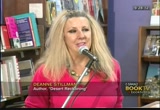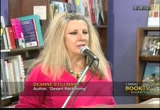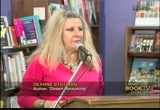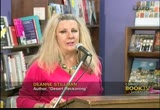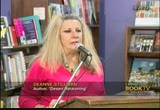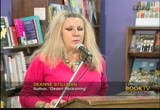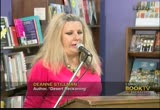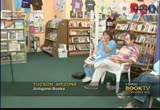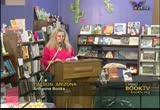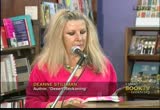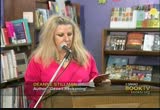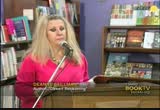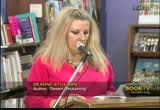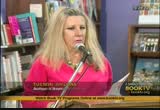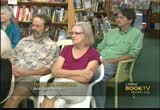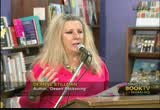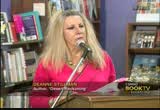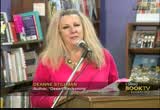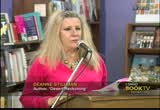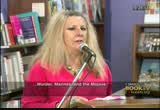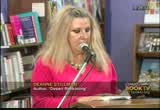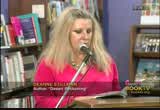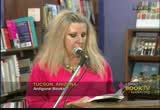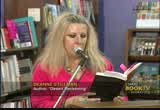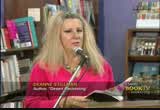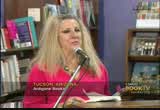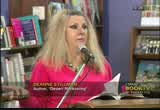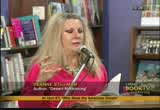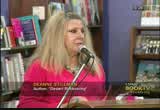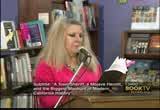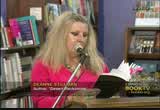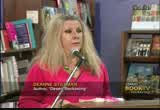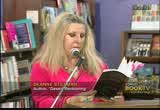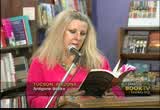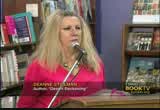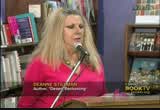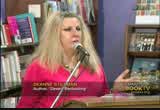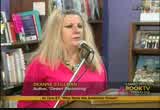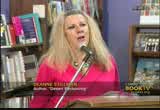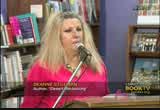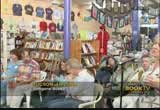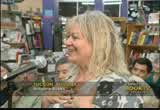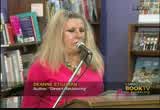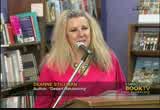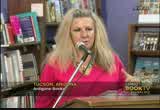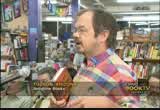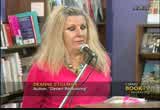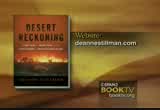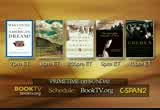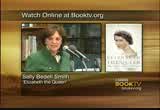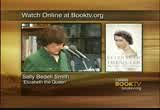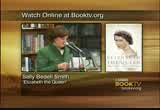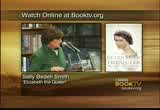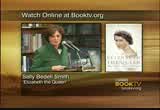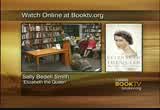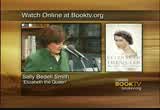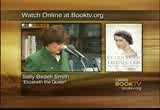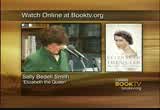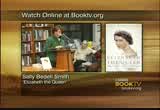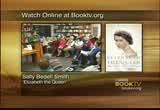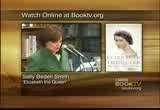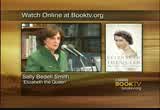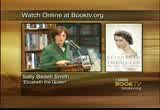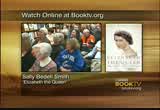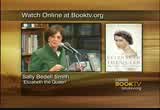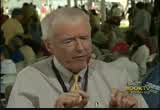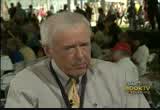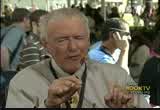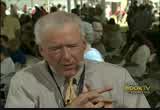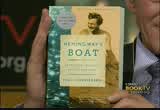tv Book TV CSPAN October 14, 2012 4:30pm-6:00pm EDT
4:30 pm
>> visit booktv.org to talk about any of the programs that you see here online. type the author or book title in the search bar in the upper left side of the page and click on search. you can also share anything you see on booktv.org easley by clicking share on the upper left side of the page and selecting format. live tv streams live on online for eight hours every weekend with top not books and authors. booktv.org. ..
4:31 pm
i recommend to my students they watch book tv every weekend. i'd like to thank all of you for coming out tonight. it means a lot to me. it's a beautiful evening, and hot out. not unlike the weather that was in play on the -- when the incident i write about in my new book, "desert wreck conning" took place. i want to tell you about how and why i came to write this book.
4:32 pm
>> and i -- i was visiting a man at his home in the antelope valley. it's like the kooky cousin who lives in the closet that nobody wants to talk about. it's mostly desert, and we were visiting, mark and i, and i was in the middle of finishing up my previous book, "mustang" and also working on another project about the antelope valley, and suddenly it was high noon and baking, and suddenly we heard all these sirens screeching into the desert, and not like one or two or five but dozens and dozens and dozens, and even for that area, where sound -- where you hear everything because
4:33 pm
sound travels, you know, very great distances in the desert, and a lot of police calls up there are domestic violence and so on. and can be very violent place and also a peaceful place. so, we decided to turn on the tv and find out what all the ruckus was about, and its turned out that a beloved local sheriff named deputy steven sorenson had been ambushed at a trailer in a relittle burb near lancaster, where i was visiting mark. it was quite a violent incident, according to the early reports, and by then this is just like an hour or two after we heard the first signs. there were choppers flying out and six or seven different police agencies were converging
4:34 pm
on the scene. it was a building manhunt, and mark said, sounds like your sort of story. but when joshua trees are involved i'm usually right there. i don't -- even though i do break for sand, much of my work is set in the mojave and the desert is often a main character. i don't do fire reporting, even though this story, desert reckoning, is a giant conflagration, ironically i don't do sign reporting but i guess i just have with this book, which took eight years, by the way. at any rate, we started watching the coverage as it unfolded, and turned out that the two main characters involved were very compelling to me.
4:35 pm
a dedicated her mitt, donald kueck, who was the suspect in the shooting and had fled after ambushing the sheriff, and turned out he was a doctor do little -- -- -- dolittle and he was live off the land, and deputy stephen sorenson as beloved sheriff in the area. he was kind of an andy of mayberry figure who was available 24/7. everybody in that part of the desert had his cell phone number and if you had a need, you could call him. so here was this very brutal shootout in the other half of l.a. county. this is an hour away from the studios and beaches but it's really like tombstone territory. and i don't mean now but in the 19th century, and in fact l.a.
4:36 pm
conclude was more violent than tombstone or deadwood, you know, at the time the country was royleing and coming into its own. so, at that point when -- a few hours into he manhunt and i decided maybe it was something i wanted to look into. of course, the desert was involved and joshua trees, and i also respond to elements of the sacred and there might be. there was this old testament scenery but mind more than that. there will two people who seemed to have some sort of longing that drew them together, longing for a connection, as i found out, the deeper i got into the story. they both had very interesting back stories which i recount in my book. so, i called my editors at rolling stone, whom i had worked
4:37 pm
with in the past on other stories, and asked them if they wanted know cover this manhunt, and they did, and this siege went on for seven days. donald kueck knew the desert so well he was able to outfox this massive high-tech posse that involved the fbi, the the dea. thousands of cops and i'm not exaggerating, on foot, on horseback, mounted posses. civilian vigilant tease. people were all over it. but a killing always attracts a lot of attention but this was very brutal, and it was -- it had all the wild west frontier elements, and it's not typical that one man is able to outfox this kind of a posse these days. so, that's what was going on as i got into the early days of the manhunt for rolling stone, and
4:38 pm
then after i finished my piece, which took two years to write, then i realized that the story needed to be a book, and so here we are. so i want to tell you a little bit about -- i recall read from it and then talk from it as i go through, and then answer your questions. >> this is from the prologue, a strange request. alone in a small trailer, donald kueck has been -- singing a song. it wasn't a pretty song or the song a casual passerby would hear in the offchance he or she was in the vicinity of the remote little abode. the music from the trailer, calling for someone to come and put him out of his misery, or the broadcast on a frequency few could monitor. his sound waves stating in the
4:39 pm
radio dead zone that pockmark the vast desert advance. but the sound was persistent and unwavering and drifted across the net of the last desert tortoise and traveled down washes cut by ancient rivers and one day it crossed, and the singer, yearning for his days to end, singing more furiously, started with joshua trues and granite slabs and bobcats until it was swept away by a santa ana wind. that high voltage foil of hot air that is born in the mojave and is said to carry messages of eye veil. it lofted across the die desert describe, over mountain and sea, and was heard by sensitive souls in other lands. sisters of the man who sang his own death song, and they called each other from okinawa and
4:40 pm
pensacola and knew something was wrong. in another desert community outside of los angeles, there was a daughter who also sensed impending doom and she knew the enwas near. animals with their keener hearing responded to the softer note that the singer's grim melody for all living things respond to music. and would come in from points south, east, north, and west of the trailer to be fed and nourished by the man who loved them but hated cops. in the morning, the jackrabbits were the first to arrive. putting themselves around the special outdoor breakfast table with portions of food placed at individual settings. other critters would stop by drought the throughout the day on their rounds. a raven would alite on a man's arm. amazing for their able to go for days without water and often seen skittering across the sands
4:41 pm
would find a rare moment of rest in their perpetual state of panic, oblivious to the day that inside the trailer, the magazines loaded with high svelte rounds and the hand-written will, perhaps calmed by the repeating reverberation of the death song. so all living things have an echo. but the company of animals was not enough to stop the man's desire to die. it is certainly within reason to figure that some of the animals, a coyote, licking his shops, possibly, or a tangle of rattlesnakes, may have even watched or slitters by as one night, perhaps under a full moon, while he was teaked on a desert cometail in summer, with the sound of his own blood thundering through this body, the devil threw him a stake. oh, it's you, the man said. now what. the devil did not answer and the man said, i see.
4:42 pm
so, that tells you a little bit about what was going on with donald kueck in his final months. i won't tell you everything that happened in the prologue but i do want to let you know that you've all heard that saying about somebody who was so -- so self-destructive, he is digging his own grave. well, here what somebody who actually did that. and took the town sheriff with him. now, on august 2nd, 2003, when stephen sorenson got the call to head out to donald kueck's trailer. nobody knows why he decided to drive on the property that day. it was sorenson's day off. but when a neighbor of cook's called him that morning the deputy said, no problem, he'd come right over, as he always did if someone had a need.
4:43 pm
the neighbor was a master carpenter with a studio system down below, working on the set of the new jodie foster movie. he was concerned about a man known as mr. x, a tenacious squatter whose trail of raw sewage was approaching baker's airfield where members of the ultra light community gathered and kept their planes. the august morning heated up, heading past 100 degrees. it was even too hot for rattlesnakes and they retreated to pockets of shade. under the greasewood or into the sand. deputy sorenson walked a place where he had recently served eviction papers to the squatter, and then told the bakers, and then got back in his ford expedition and started for home. but something changed his mind. to this day what was was is not
4:44 pm
known. when he arrived mr. x was gone. he drove to frank's place to tell the family and then headed north toward home. but something, what, some ancient siren call, straining death being broadcast on a strange frequency. did sorenson and then turned back and paused by the kueck driveway. he spotted the old down dart and ran the plates. it's not known if sorenson received the information from the dmv database because so-son may not have known that the owner was donald charles kueck, a man who had spent months trying to get him fired, writing letters to everyone from the fbi, to the l.a. county sheriff, after sorenson pulled him over
4:45 pm
an remote desert road for reckless driving on a hot summer day in 1994, at noon. i live alone in a rural location, kueck wrote in a detailed statement that accompanied his plate against sorenson at that time. and now i fear for my safety. now, again, you'll have to read this chapper to to find out exactly what happens after sorenson continues continues toh donald kueck's trailer. i will say this, as he turned down the driveway, deputy sorenson -- we don't know whether or not he looked over to his right and saw this grave that kueck had been digging, and if he did see it, what he thought about it, if anything. did he stop? you know, ponder, keep going? nobody knows, but it's one of the more mysterious elements of the story and this is somebody
4:46 pm
who did dig his own grave and then took the town sheriff with him. so, the neighbor who had called deputy sorenson, complaining about the squatter, heard the shots and called police, and that's what kicked off the manhunt and the sirens and the launch of the sirens that mark and i were hearing that afternoon. i want to tell you a little bit more about donald kueck, the her mitt. we usually don't think of a her m.i.t. as having a family. that's why they become hermitys. they don't want anything to do with anybody and have severed all ties and that's what he did one day during the 1970s. he had been married and had two kids and came into the breakfast table one morning and told his wife he didn't want her anymore, got up and left and gab gravitating towards the desert, which he had in my view, been longing for, for a long time. a lot of people just -- that's
4:47 pm
the only place they can flourish, like joshua trees and other plants and animals that can only live in one place, and this is someone who was not really cut out for civilize yeah, deputy stephen sorenson was an ex-surfer from the south bay in los angeles and he, too, gravitating toward the desert and volunteered for the position of resident deputy in a remote outpost. cops know they have a dangerous line of work and that anything can happen when they get up to go to the office any day, but very few of them will volunteer for a remote beat like this because if you get called on it, like, to a domestic violence incident, it could take an hour for backup to arrive. this is a violent and dangerous beat and takes a certain kind of person to want to take it on, and in fact i at one point
4:48 pm
asked -- i sat down with sheriff lee baca, the chief sheriff of the los angeles county sheriff department and it's like the sixth most powerful law enforcement agency in the world. it's huge. and i said, why would somebody -- why did deputy sorenson volunteer for this beat? he said, whatever it was, it was his mission to protect god's creation. i thought that really told me a lot about deputy sorenson, and as you read my book you'll see that it's not just a line he threw out. deputy sorenson was -- interestingly enough he and kueck were the same side of a coin. and when he was called to meth labs he would take in abused pit bulls, and i wound up getting to go to his house during the eight years i was working on my book, and it turned out that all the animals he rescued were still at the house, which is an amazing
4:49 pm
thing. their spirit was there on his land, and it was very powerful, and kueck, too, his best friends were animals and he talked to bobcats and had breakfast with jack rabbits, so these two men, -- hermit and a sheriff, even the one went bad, had much in common. kueck had two kids and he became -- he longed for them -- this is the longing i explore in my book and kind of a theme that runs through my work. he tries to reconnect with his kids. at some point, like a few years before the violent instance department and they have a reunion at bob's big boy in
4:50 pm
southern california, and his son, donald kueck by then, was teenager, and pretty well known -- actually kind of notorious singer. was in a lot of bands, and a longtime junkie and when he and his father reconnected they decided it would be a good thing for father and son to kind of continue this to see where the spark went, and he moved out to the desert for a while to live with heir father, donald kueck, and he sed up shop in -- one of the things that don did out there in his compound was he acquired all this flotsam and jetsam and would barter and trade for neighbors for things he needed and they needed, and he'd fix up old cars and van. and he had this old van on his property that they labeled the anarchy ban, and joe would go in there and get high.
4:51 pm
and listen to music and sometimes don would go in and hang out with him, and the friends would come out and make music, and it was boys together running around in the desert. kueck was a brilliant self-taught rocket scientist who beyond to hob nobody with the engineers at edwards air force base so he and his friend would run around sometimes in the desert, setting off rockets and blowing stuff up. being boys together. but this father-son thing didn't work out. don wasn't really cut out to be a parent, which is why he moved to the desert in the first place, and the relationship degenerated and the son ended up fleeing to seattle. he idolized kurt cobain and was a long-time junkie and ended enoverdosing, and when it happened in los angeles prior to
4:52 pm
this shootout at kueck's trailer, and after the son died, his friends predicted it was only a matter of time before kueck, the hermitt, went off the rails. i want to tell you about the manhunt and some of the people involved in this. the los angeles county s.w.a.t. department -- they had trained -- they were very well-trained in urban warfare but this stumped them. they had never really spent days tracking anybody in the desert, even though this is l.a. county, and they realized about day two or three they needed a place to land their chopper and couldn't find -- there was no place in the desert and no place to have no trespassing signs. it's not like you can knock -- a lot of heavily armed people there who not a want a police chopper landing in their front
4:53 pm
yard. so here's where they ended up staging -- with every hour that a criminal is on the loose, the chances of finding him diminish, by the morning of day two, thousand cops and deputies had joined the manhunt. some traversed the desert, walking every cubic centimeter. l.a. county was sparing no expense on the search, which had morphed into the type of monster that kueck feared, and overwhelming display of manpower, vehicle, food, aircraft, minuted civilians, dogs, weapons, ammo, ammo fuel, surveillance equipment and tracking gear. at the retreat center in palmdale, sister mary mike wallas taking a sunrise walk among the boulders just after morning mass. she gazed eastward towards the three sisters butte, a mountain
4:54 pm
range where three rounded peaks're prominent. a marker of comfort and beauty that brings the endless desert scabs to a rolling stop, beckoning the pilgrims to slow down ever more and take stock. what was it called when the anises are sos of the indians traveled up and down the trails heading westward into the mojave and then crossing another mountain range to trade with their brothers at the edge of the pacific ocean. no one knows the answer to these questions but the members of the order of mount carmel sometimes joke that they lived near the three sisters butte to invoke their calling. mount carmel was a convent that served the area, offering daily mass and comfort and providing a day care center for children whose parents worked the valley's orchards and fields.
4:55 pm
knowing there had been a deadly incident nearby and that the fugitive could be lurking, sister mary michael was somewhat wary as she strolled on the second day of the man hunt but she was struck by the land and sky and light and reduced one more time to a state of sheer humility and awe. she offered up a silent prayer of gratitude for her blessed life among scenery that looked liar the birth place of the savior, and approaching from across the sand, something about the gait told her the person was a man. it wasn't unusual to see someone walking the desert at dawn bit wasn't all that common, either. she grew more suspicious and wondered whether the advancing figure might be the wanted man. he was big and tall, she noticed, and was heading directly for her. reversing course, she turned back towards the convent while keeping an eye on the stranger.
4:56 pm
she now saw that he was wearing a dark suit. how strange. that's not what the radio said. he is supposed to be wearing a t-shirt and maybe some jeans. does he want to hide in the convent? what about the children? she picked up her -- with two legs. the man extended his hand, said, los angeles county homicide. the carm mellite order began in the 15 under center -- according to the old testament it was atop this peak that elijah battled with his disbelievers in the test of faith, calling down rain in a time of drought. decades later the order dedicated itself to st. therese, the mystic who was torn between the material and spiritual world and battled with demons as she
4:57 pm
fled inward. during her journey she underwent a series of miracles that happened after bouts of ecstasy. the cop vent was ideally situated on 180th street east, main drag in palmdale, where cell phone reception was good and with plenty of wide open space around it, save for the intermet tent creosote, joshua tree and rocks, not bad for a launching pad for helicopters. so that's where the s.w.a.t. team staged the manhunt. from a convert in the middle of the desert. i was stroke by the fact that here were these two cloistered orders, up ins -- nuns and cops that we civilians don't call on unless there's an emergencyings here they were coming together in this extreme situation, and while the cops were there the nuns were cooking for them and praying for them and some of the cops who were catholic were
4:58 pm
taking mass with the nuns, and then by the end of the week, the -- i don't know if i said this but here's what was happening. by the end of the week the cops were giving the nuns rides in the chopper. [laughter] >> i know, isn't it amazing? conjures up, here they are, members of the order, and -- which was started in honor of st. theresa, and occurred to me they were probably having a moment of ecstasy in the chopper over the mojave. [laughter] >> so, meanwhile, the manhunt is growing, growing, growing, and more and more like vehicles are coming out into the desert, and the sheriffs department by now, by day four or five, decided to muster this tank called the bear, which was used in the gulf
4:59 pm
war. it was for use in the gulf war, and later used in the hunt for bin laden, i believe. and this manhunt was unfolding at the same time as the hunt for bin laden. so, actually -- i talk about this in my book -- two parallel men, one in their homeland and one of our deserts and a foreign desert the hunt for bin laden, using some of the same gear and intelligence equipment and infrared technology and making the same call, dead or alive, and bin laden and sheriff baca came out and called for the capture of donald kueck, dead or alive. but he was -- because he knew the desert so well and had allies with animals he was able to -- he was doing what they did. out there in the wild. probably hiding in burrows and caves and at one point he did have a cell phone and was calling a daughter, the daughter i mentioned earlier who lived in the nearby city of riverside and
5:00 pm
he was calling her while he was on the run, and he said he was -- at dawn when the ground temperature is the same as body temperature, if you hide in the sand, you can elude infrared technology because i can't detect body heat and he was calling his daughter and saying, i'll be coming over again. ...
5:01 pm
>> choppers hovering over a, it was like to giant choppers come it was really quite surreal. he started injecting teargas into the complex. while this final seed was playing out in going on, the detective, who is one of the los angeles county sheriff's department deputy really, i couldn't have done it without him. he was on the phone. he was calling his daughter and the detective was trying to convince him to come in and
5:02 pm
surrender. it was very dramatic. the doubters in the background. they were trying to work out a deal with the detective. i want to read you a little bit about the final conversation. it is really kind of day shadowplay. >> again, it is hot, it is like 110 degrees, it's a smart -- he is trying to be smart and flush them out. >> hello, my name is mark and i am a detective for the los angeles sheriff's department. my cell phone battery is on its last leg. can you please turn the
5:03 pm
walkie-talkie on. it has many channels. and you push the red button on the side. is there something we can do for you? i don't want to be rude, because you can't. those two asian doctors are terrible. he didn't want to go back to jail, he had spent time previously. he vowed that he was never going back on. >> we have all kinds of doctors in there, why don't you let me speak to non-asian doctor? >> i can't even do so. and i mequon. are you allergic? mark, the sherpas telling us. and the detective was talking to headquarters. his arms got very tired, among other things. don says put in solitary. i have chronic fatigue syndrome.
5:04 pm
some of those cops are going shooting outside he said. don't tell my mother, my father was in the airport and i have to go, i'm hanging up mark, i can have them there in 10 minutes. keep the phone on for five minutes. >> i'm going to get my glasses so i can see. >> hang on, stay with me. you're going to hear someone talk on the radio. you have to quit moving channels around. he will find the one you are on. it might be a minute before i answer. that is typical of our equipment. it is 3:20 p.m.
5:05 pm
you sound like you are smarter than i am when it comes to police radios. don, i don't want to get arrested or killed. mark, nobody wants to do that. there are probably a million cops out there. why not calm down now. and the conversation goes on. the cell phone is cutting in and out and finally the police move in and he's not coming out, but he starts running, trying to move in carrying through with dyslexia. this goes on for hours and hours, and then finally this whole place is in a small room, as i said earlier. at midnight, there is no more contact with him. and they still don't know, even after a week, even after this scene, after having been chasing him for weeks and they didn't really know if they have gotten him in. even three hours after the fire
5:06 pm
had begun region. now, two teams were sweeping the field. they formed a scrimmage lines and then walking through the rubble. once again, they felt vulnerable. that all things can go through your head at any given time. the least half of the men were planning to leave for a golf trip to nevada later that day. i had put down the deposit of months ago. we have to hurry up, if we don't, we will miss our plane. and on they go with a little representation of the 23rd psalm. the one that is often thought of one in danger. they continue to walk through the compound. they are searching in the dark with hand-held lights. it had been a long stage in to
5:07 pm
williamsville this time for them to go home. he was replaced with another canine and the men continued their weary march. ten minutes after the search began. he spotted two of them jetting through the ashes. the men moving through a portion of the rubble. he was nearly cremated. a few days later, his family scattered his ashes. on august 11 at 8:06 p.m., the dispatcher announced the traditional roll call. for a deputy killed in the line of duty. from the patrol car he said it was an honor to know you, a privilege to work with you, god speed to everyone all over the
5:08 pm
desert. from 110 lincoln avenue and 113, he will never be forgotten, my brother. your family is in good hands and we know you are in good hands up there. rest in peace, my brother. and after it all went down. it's still fluttered in the wind. there were some old jars of peanut butter. the land remained with lawn mowers and tables and chairs and benches. there was a broken down la-z-boy facing the view. cook's chair, when he sat in. when he watched the sunrise over the mojave. he had come out here to escape civilization, but he knew he could be evicted at any point. civilization can want people to
5:09 pm
violate this code. and in one of his last letter to his sister, he said i'm i am telling you this because i get choked up and i'm talking about personal issues. i know that the next life is waiting for me, don't you blame blame yourself. if the inevitable comes to pass. this feeling has been going for the last one or two years. then, in a burst of optimism, he added, course from the future can't be changed and it would be fun trying. since i was 20 years old, had the dream of building a little place in the desert. to the right of the la-z-boy, the remnants of the house that he never fell. one of these days he was going to make a course correction. he never got there and never went. it is the first thing you see on
5:10 pm
the way out. a project he made sure to finish. now filled by wins and erosion. they scattered flowers on his grave. okay, so that concludes my story, and i just want to and what the passage of the fair about long that i often turn to. >> what are the facts of the human mind and human heart when they are all quite clear throughout time. a profound longing for god. thank you, all of you, for coming. [applause] thank you, everybody. if you have any questions, i am happy to hear them.
5:11 pm
questions or comments -- cleanups? my question is, how do your reporting? how did you manage that? you didn't even didn't even know the pleas of the time, did you? >> thank you very much for the question. i was kind of monitoring the manhunt. there were people gathering. there were memorial is for the sheriff and the hermit, they were just sort of coming forward. one of the people that i write about, they are they're not kidding when they have no trespassing signs.
5:12 pm
you have to wait for them to come to you in one way or another. as i said, this was in my previous book. one reason for that if it takes a really long time for the people i write about to open up and want to talk with me, just like it does in actual life, dealing with paranoia and these are people who we've come we, as a culture, we give them a short trip and they know it. in particular, it takes a really long time for me to, you know, get to know people. and then i start once they open up, they are some of these people that are friends of mine for less than. people codevelop a very close friends of mine i've been to
5:13 pm
their weddings. i have developed very close friendships. not everybody, but that is a long way to answer the question. you are asking on how do day have contact with me. well, i stay have contact with me. well, i started introducing myself. i don't think i knew any of the cops in my story at the time. a couple -- he felt that my work was bare and they knew that my work would speak up for these people. a lot of people feel that they are misunderstood and people are listening to them. they are right. i feel like that, at times i feel like that, too.
5:14 pm
no some have no voice in this culture. some dealers they did, they are not treated well in the media. that is often the case. they are people, too this is something that i get into my book. excuse me, i write about that in some of the lead characters in my story are critical, like the members of the swat team. they were, as i was making my initial call, they would not -- they were initially very suspicious. there is a perception that they think of they think of live
5:15 pm
music and sex drugs, and rock 'n roll. but they have a longtime history of publishing really good complicated work. rolling stone us. they didn't know about that. with some of them it helps if they knew about my work. but not everybody. the sensation of rolling stone was pretty palpable early on. as i started getting to know them and hang out with them, you know come you get a feeling for people. i was in it for the long haul. and you know, i don't do that. so they responded to that. one detective started talking with me and letting me listen to the tapes early on.
5:16 pm
a couple of the elders, elders, you know, they came on board. it kind of went from there. but i still had trouble with a lot of the cops. i had to go back to a lot of people when i started on my book. after my piece came out in the rolling stone, the detective called me up and said wow, it's great. and many of the other said so as well and i went from there. i really appreciate that because, you know, again, the people that we call in an emergency item. the thing as it went from there.
5:17 pm
[inaudible] they get that in a kind of start talking with me about all sorts of things. for instance, the story and information about this swat team at the convent. it wasn't like on day one, oh, by the way, they were at the convent. no, that came out years later. just rude conversation. that is how it went. that is how it goes for me. there were some people that i needed to speak with and i haven't heard from them. as my book was when the press, i had some friends. there was a major sin who died of a heroin overdose.
5:18 pm
some of them were very willing to talk with me. [inaudible] so one of them, it started with one to talk to the people that i needed to talk with. it was critical to the overall story. they started calling me as my book was going to press. it was amazing because it was a very crucial part of this toy. it talks about how the land can help heal people's wounds and what that is all about. and what is at stake if we don't preserve our desert spaces. where is home for a certain kind of person? again, i'm not just talking
5:19 pm
about this. i'm not talking about rebels. i'm talking bout some members of law enforcement. some feel it is their duty to go out and protect god's creation. >> anyone else? >> the essence of my questions about how these long novels, which are often about the voiceless, which as you said, but also about these kind of tragic lost souls in so many ways. i'm wondering how years and years of working on those books, with all the details and the correctness that you are aiming for, how do you keep yourself cool in some way?
5:20 pm
have you not collapse under the tragedy and everything. that is the essence of my question. because i feel so much, when i read your passages -- i love your kind of interesting sense of humor that comes through as well. like, it's not like reading something heavy and totally dark. there is so much beauty. those lyric passages about the desert and the animals. i kind of lives get on those pages. but at the same time, i saw myself wondering how do you sustain your own sense of hope and positive emotion when you get so close to people that have suffered in our culture and sit with the land and see how it becomes so much of a graveyard, a junkyard, all of those things.
5:21 pm
and a temple. a temple to everything that has happened. is there anything you want to say about that? >> that is a very good question. and it is very critical. kinds of stories have taken their toll in my life. an emotional toll. another reason my books have taken years, is because i have to step away sometimes. my previous book is about an account of the wild horse and i look at the massacres of 34 wild horses -- i started in 1998. that is just about one thing that put me away. but these stories -- they call me. i have an identification with the people i write about in the animals in the places.
5:22 pm
we don't have the time for me to go into all of it, but i have written essays about it and i have pieces on my website. deanne stillman.com. i talk about some of us in the introduction, too. a lot of it has to do with the situations like this red these stories do take their toll. i was home from washington, getting to know some of these horses involved in the survivors of some of these attacks. i would come home with chest pains, really. this is heavy stuff. but i look for moments of grace. i appreciate that they are in my
5:23 pm
book. i am always amazed at seeing a cactus growing out of iraq. these unexpected moments of beauty. and what leftists are in order to endure. it is sort of what sustains me and the people themselves. they are incredibly inspiring. strange and violent ends -- in some cases, some of the kids i write about in 29 songs are amazing. they were the point of light red george h. w. bush was talking about that when a particular incident happened after the gulf war. that is what 29 songs is about.
5:24 pm
two girls that were killed by marine after the gulf war. i explore the world of ruthless kids living in the shadows of a giant military. the modern frontier. it's taking care of each other they are very inspiring to me. maybe moments of grace. he took care of wild animals can i write about that in my book. he was more rooted in civilization and beloved by many locals. he, too, rescued animals and took your chosen you know, he was a hero for many.
5:25 pm
he had produced dire circumstances. a lot of them could have turned into these guys out in the desert. you know, violent people. but a lot of the outlaws in the old west, they would come in. the locals would hire them to clean up the town. it's like clint eastwood in the movie be unforgiven. so there is that in there are these incredible moments. incredible moments of hope. what i noticed in all of my characters and what i respond to , they are all longing for some connection. [inaudible] a human connection that most
5:26 pm
people are longing for. and that is what is driving all the stories. you know, even the people who go out in the wilderness and something is remiss there, obviously. and somewhere people are telling him that this is a form of acceptance. someone is telling them that they are doing a good thing. but there is a broken circuit there. so that is kind of what i'm looking at. also, there is the american credo. it's a free country, i can do what i want. what happens when that -- that's great, i love it, we are a country that is hyped up on freedom. but what happens with that idea and what happens with a person
5:27 pm
with personal pathology. you can't set that notion down. and then the people out in the desert, thinking and learning and living alone. hearing messages and reading things. they're getting a lot of information to tell them whatever they are thinking is okay. there is no check or balance. especially for people who have completely cut themselves off from their own families. >> again, they have the wisdom and the stories -- these are really powerful events. i believe that this is a calling. i respond to the quiet in the
5:28 pm
desert and hear things in software. i respond that way. believe me, people, and all the time with certain stories that have not heard just because they're in the desert. and they think oh, but those desert people really terrible. and i just don't -- i don't answer. i have to connect and identify with everything i write about. if i don't, i turn it down. my editors wanted me to cover the michael johnson child molestation. it made me absolutely sick. i felt that the whole thing was filled with liars. everybody, everything. so, i mean, i was pretty selective about these things.
5:29 pm
i don't look for them. that is sort of a detour to your question. i appreciate your asking. i mean, because it is hard. it can be a rough calling at times. thank god for van halen and foreigner. great music, you can have this in the desert and not the that's the only place you can hear it anymore. [laughter] remap the desert, stuck in the 80s. yes, did you have a question? >> i wondered what you might be working on? >> i'm kind of superstitious about work. but i will say that i'm going back into the frontier era. i'm exploring some of the territory i did before. thanks for asking.
5:30 pm
he meant to be a question of your? >> sure, go on over to the microphone. sorry. >> that's fine. i have all my. [laughter] >> basically, on the final standoff between bush and the sheriff's department, during a manhunt, did donald cook have a stash of weapons handy or did he just this one automatic rifle that he used to shoot the sheriff's deputy with? and second of all, you compare the final standoff, like ruby ridge or the waco, texas, situation -- all the cops against one person? >> it did have those elements. but beyond that, it is not really in comparison. it wasn't like cook was in a standoff by himself. it wasn't due to political beliefs or, you know, he was wanted by the irs or something.
5:31 pm
[laughter] he didn't have a stash of weapons. he had the assault rifle that he had had it was in his trailer. he had killed the deputy sergeant was on the run. i think during that week he had the deputy's revolver. i'm not sure if it was found there in the rubble as well. but he didn't have a stash of weapons. he was one guy going off like tony montana. >> when he was digging his own grave and he saw the devil and he said were shed to get? and he said between a rock and
5:32 pm
hard place -- did he know what he was going to do? because of the impending doom and music going through his head at the time? did he know i was actually going to happen? >> well, he did see various family members and he was conscious -- he told them that he had ducked his own grave and sent a map of what was feared by then, he was on a downward spiral. his son had died of a drug overdose. he had done time in the california prison system for a felony. he had been melting down out there in the desert since coming out of jail. but in particular, the death of his son willie pulled them over. some of his relatives suspected that he was doing so. and he told some of them that he dug his own grave. he was ready to check out.
5:33 pm
friends of his son, joe, had realized that when his son died, it was only a matter of time. they were not surprised about what happened. of course, the incident was shocking in its brutality. but they weren't exactly surprised. >> is there anyone else in a. >> okay. >> hello. if you don't mind a shallow question. after all the deep psychological top. >> oh, you're welcome to ask. >> one thing about the book that i think made it so alive and real was the specific details. you have had like 479,000 details in the book. how do you keep track of all those details, which i assume
5:34 pm
are true? >> just. >> and they are all they are. >> thank you for asking. i keep extensive files, for one thing. i do love the desert. i have been wondering that for many moons now. i do keep extensive files. for this book i had a file and narrowed it down to this particular area you can go to certain archives and find information. records, native american records and so forth. an oral history, i keep files
5:35 pm
about the character. i keep pretty extensive files about facts and histories that i am working on. if that makes sense. does that answer your question? i don't come in terms of talking with people, generally don't take notes. sometimes when i'm finished up, you know, i go home and write down the conversation. and i have a great ear for dialogue. you need that, you have to have that relationship with your publisher and so on. but, i find that when i'm talking with people, i file my mental notes away.
5:36 pm
the best part, it seems to work out. i just pay more attention to things. so it kind of works like that. plus, i like reading about all of these races and people. i am excited and suddenly i realized, you know, i haven't been thinking about it -- but one day i wrote something years ago. you know, a desert trail of paper or something. something will happen and i will hear something or it sticks in my mind -- in the middle of this or that, the story were that way. i can read a piece of information or a story. that happen a lot here. in this particular work of things coming together.
5:37 pm
is there anyone else? okay, well thank you, make you very much for coming. i really appreciate it. [applause] >> thank you all for coming. again, deanne stillman will be right here signing copies of her book. they are up to the counter, so come on up. >> for more information, visit the author's website at deanne stillman.com. >> you're watching booktv on c-span2. here is our primetime lineup for tonight. starting at 7:00 p.m. eastern, hedrick smith wins it america is no longer the land of opportunity. then at 8:00 p.m., in author shares her experiences in new mexico red at 8:30 p.m. eastern,
5:38 pm
and author details the life of hattie greene. who died in 1916 and use her family's inheritance against popular thinking at the time, resulting in a network of close to $100 million, which is equal to about $2.5 billion today. at 9:00 p.m., "after words." invisible wounds of war is the book. and we could include tonight's coverage with jeff cohen and john chase. the two "chicago tribune" reporters taking a look at the political demise of rumble goodrich. it happens tonight on booktv. >> the queen was making her way through a crowd of nearly 9000 people and reading a selection of guest. she was asking such standard
5:39 pm
questions as have you come far? one woman looked at her and said, what you do? [laughter] several days later at a friends friend's birthday party, the queen described the exchange in confessed that she had no idea what to say that it was the first time in all the years of meeting people anybody had ever asked me that question. well, my job in writing "elizabeth the queen" was not only to explain what she does, but to tell is really like. to take the reader as close as possible to elizabeth, the human being. the wife and mother and friend, as well as the highly respected leader. today i'm going to talk about what it was like to write about queen elizabeth. secondly, i would like to share with you some of the many surprising discoveries that have made about the queen. because she is the best known women in the world.
5:40 pm
people feel as if they know her. but the real woman is very different than the woman in velvet. this is my biography, all of them are about larger-than-life characters, as barbara mentioned. there is no one like a queen. she lives in her very own remarkable world. while other heads of state have come and gone, elizabeth is the longest serving leader in the world, spanning the 20th and 21st centuries. she is the 40th monarch in the thousand year history of the british monarchy. she reigns over the united kingdom in england, wales, scotland, and northern ireland, along with 16 rounds and 14 overseas territories. she is the second monarch to celebrate a diamond jubilee, marking 60 years on the throne, which is a milestone that she will reach on february 6.
5:41 pm
the only other was her great great grandmother, queen victoria, whose celebration was 115 years ago. in 1897, when she was 78 years old. elizabeth, who will soon turn 86 is still on the throne in september of 2015, she will surpass the reign of victoria of nearly 64 years. between the two of them, victoria and elizabeth have been on the throne for 124 of the last 174 years. and they have symbolized britain's far longer than the men who were kings between their reign. but being queen makes her a solitary figure. it is crucial for her to keep a delicate balance at all times.
5:42 pm
if she seems to mysteries henderson, she must bond with her subjects. she seems too much like everyone else, loses her mystique. she does not carry a passport. she does not have a drivers license, although one of her cousins told me that she drives like a bat out of hell on the roads of the country estate. [laughter] she cannot vote, she cannot appear as a witness in court, and she cannot change her fate to roman catholic. because of her hereditary possession, everyone around her, including her closest friends and her family bows and curtsies when they greet her and when they say goodbye to her. although she was trained by nannies who prevented her from being spoiled she was also trained to respect and deference. a friend michael me about this
5:43 pm
one then princess elizabeth visit the family's castle and scholar. and a cousin playfully threw her around, roughhousing. the father punched him in the stomach and says don't you ever do not royalty. my friend told me that that was the structure in which she was brought up. so how does a biographer, particularly an american penetrate the royal bubble? especially when the queen has had a policy for the past 50 years of not granting interviews. i am a longtime anglophile, and i have visited britain frequently over the past three decades and made a lot of friends in the process. some of whom helped me when i was reporting my book in the
5:44 pm
late 1990s. when i started researching the queen's life, and went back to a group of key sources those who introduced me to more people who knew the royal family. they also serve as my advocate in getting cooperation from buckingham palace. my work on diana had been fair to the royal family, and particularly to charles. the senior staff briefed the queen and they gave me the green light. as a result, had i had access to her inner circle of close friends and advisers. the queen has disciplined herself to keep her views and emotions under wraps in public. those close to her shared with me some of her thoughts and opinions and feelings. what worried him most about prince charles when his marriage to diana was falling apart. for example.
5:45 pm
what would happen when she became physically or mentally incapacitated. and even some critically important opinions, including one hot button issue that she discussed with an american ambassador. and her serenity encourage and they sized her up in some unusual ways. the california horse whisperer was one of the most unlikely friends, and he said that when the queen gave him good advice, she showed an incredible ability to read intention, just like the horse does. i was also able to watch the queen in many different settings. at the parade at windsor castle, representing buckingham palace and that one of her annual garden parties at the palace.
5:46 pm
for that, i received a personalized invitation embossed with gold with the queens crown encipher i'm announcing that the lord chamberlain had been commanded by her majesty to invite me. and everybody got that. watching the queen makes her way along the lines of people, i was struck by her measured pace. the lord chamberlain, the senior official at buckingham palace, later told me that she moved slowly to absorb everything that was going on and to take as much in as she can. i also marvel at her mastery of brief but focused conversation. and her sturdy stance. a technique that she wants --
5:47 pm
once acclaimed by lifting her dress and saying making sure that your weight is evenly distributed and that's all there is to it. as i observed her over the year, i chelated impressions that helped me understand how she carries out her role in how earnestly she does the job. with great discipline and concentration in every situation. she is not just a figurehead. and she has an impressive range of duty. every day, except christmas and easter, she spent several hours reading government papers, as described. they are delivered. they are red letterboxes and that can only be opened by four keys. she read them in the morning and at night and even on weekends. one of her close friends told me about the time during one of the queen's visit when she was doing
5:48 pm
that all morning. must you, ma'am? the queen replied if i miss one, i might never catch up again. the youngest daughter told me that when elizabeth was a young 25-year-old queen, her father had been impressed by her attentiveness, that she always paid attention to whatever she was doing. it is hard to imagine the amount of information the queen has accumulated every six decades. she had used it in exercising her right to be consulted and to encourage and to warn when she meets with government officials, as well as being and military offices, who come to her. as she once said, the fact that there is nobody else they are
5:49 pm
give them a the feeling that they can say what they like. the most important encounter at these encounters have been the weekly audiences with her 12 prime minister. consider the trajectory from churchill, who was born in the 19th century and served in the army of her great-grandmother, queen victoria, to david cameron, her current prime minister, who was born three years after her youngest child, prince edward. she actually glimpsed for the first time her future prime minister when he appeared at age eight years old in a school production of toad of toad hall. probably her most fascinating relationship was with margaret thatcher. in the course of my reporting, i gained some great insight into how that relationship worked,
5:50 pm
some of which contradicted the common view. the queen does not have executive power, but she does have unique influence. in her role as head of state, she represents the government officially at home and abroad. she also serves as the head of nations, which means that she connects with people to reward their achievements and remain in touch with their concerns. two decades past the normal retirement age, she still do something like 400 engagement the year. traveling around the united kingdom, the cities as well as other areas. the private secretary that served to john major and margaret thatcher told me that the queen knows every inch of this country in a way that no one else does. she spends so much time meeting people that she has an understanding of what other people's lives are like. she understands what the normal
5:51 pm
human condition is. she has also spent an extraordinary amount of time honoring citizens and members of the military for exemplary service. she has had more than 400 -- 4000 honorable awards. and served at least 600 of them in person. people need pats on the back, she said. otherwise it is a very dingy world. she was 83 years old at the time and her program called for long days of meeting and greeting. her stamina was impressive. matched only by 88-year-old prince philip. whenever they go off on a trip together like that, the lord chamberlain always accompanies her to the airport. it turns around and says mind
5:52 pm
the shops. i have a real sense of how philip and elizabeth are with an expert choreography, kind of like fred astaire and ginger rogers. i also saw aspects of him that contradict his caricature of sensitivity. he also watches the queen intently to future needs assistance. i once saw him bring over a little child to meet her. he will walk people ought to give them a better vantage point. when the queen needs a boost, he is there with a humorous comment , like don't be so sad, sausage. i also witnessed at close range when i had heard about from several people that the queen doesn't perspire, even in the hottest temperatures. the british high commissioner was hosting a garden party in
5:53 pm
his hilltop home on a steamy evening when everyone, including me, was dripping from the heat. after an hour of conversation with some 65 guests, the queen walked past me very close by and there was absolutely no moisture on her face. one of her cousins who traveled with her explain to me in her own inimitable way to the queen's skin does not run water. [laughter] while it may look good, it does make her uncomfortable. i saw further evidence of this a year later on a july day at ground zero and manhattan when the temperature hit 103 degrees. one of the women, the queen spoke to, said to me afterwards -- we were all pouring sweat, but she didn't have a bead on her. that must be what it's like to be a loyal. during these trips, i was able
5:54 pm
to see the buckingham palace machinery on the road. to get a feel for the queen and the way her household has changed from the early days when it was run entirely by aristocratic men. as i stood in the lobby at her hotel in trinidad, the master of the household pointed towards a half-dozen maids, one who was a woman, one in a blue suit. see him over there? he had a master's degree in paleontology.paul >> you can watch this and other programs online at booktv.org. >> everything he loved in lifeie and lost. s the mr. hendrickson, wh and lost. mr. hendrickson, what was the pillar? >> it was a 38-foot fishing cruiser that hemingway bought i
5:55 pm
1934 and only for the last 27 years of his life. it was probably, peter, the mosd beloved material possession that he ever owned. and so i thought maybe i could tell that hemingway story in a new way through the pillar as a figurative storytelling device. >> what did you find out? >> welcome i went to cuba in 19 -- excuse me, 2005 when i went to havana. when the guards weren't looking, i leaned over and touched the vote, which was a moving th experience. e,e vote was drydock, it was onm a hillside at hemingway's home, and it was in terrible dying condition. it looked as if it were dying of thirst and only wanted to get into water.d without further a convinced mehe that i had a story to tell
5:56 pm
through the prism of this vote.h when hemingway got to spoke, he was the reigning monarch of american literature. an he was at the apex. when he lost this vote is whentn he lost everything. when he killed himself by shotgun 27 years ago. this vote lasted him through three wives, the nobel prize,hy and all of his ruin, which is why it is subtitled come everything he loved in life and it was lost. >> where was it though? how much time did it take?ookl it was built by a shipyard in brooklyn., the we are manufacturing company, which was a very reputable fishing boat, cruiser heat, construction company.at he looked for a long time before getting the boat, the exact boat that he needed.cification
5:57 pm
he went out into the gulf streay and off of key west and began catching these 850-pound marlin. that became his refuge from thee world.wod. >> what did it cost? >> that is a great question. the boat in 1934 cost $7500. and he put down $3000 as a downd payment, which was given to him by the editor of a new magazine esquire. gave him and arnold gingrich was the editor and he said i will give you 3000 towards your newarticl. >> fishing boat if you start writing articles foren me. >> c-span quite a bit of time ow hemingway's family in your book, hemingway's boat.t. i wanted to understand one of the most powerful stories.
5:58 pm
one is the story of his third h son, gregory, who grew up to bew a doctor who was a transvestite who ended up as a transsexual. t i tell the story of ernest hemingway and his children yes, it is a kind ofch multi-biographical approach, which seems to be what i know how to do. >> gregory became juju? >> he actually became gloria. a he had a complete sex change. died 2001 in a woman's jail cell in miami. and and i knew him in 1987, and i tracked down all three of the
5:59 pm
hemingway's sons, and i spent time with the eldest, the middle one who is alive and was diggy, the third son who died in 2000 nnd. lives i >> one is still alive?ontana. he >> yes, patrick. he is 84 years old and lives in montana. he is the surviving hemingway son who had a lot to do with tho life of hisat father's vote. m all three sons spent time on the boat? >> absolutely. hemingway was married foura times. three wives spent time on the te vote. through a combination of archival research, i was able th find out that this boat became a central idea. a central idea to his existence. he would get away from land, but it is a funny thing. you go out
211 Views
IN COLLECTIONS
CSPAN2 Television Archive
Television Archive  Television Archive News Search Service
Television Archive News Search Service 
Uploaded by TV Archive on

 Live Music Archive
Live Music Archive Librivox Free Audio
Librivox Free Audio Metropolitan Museum
Metropolitan Museum Cleveland Museum of Art
Cleveland Museum of Art Internet Arcade
Internet Arcade Console Living Room
Console Living Room Books to Borrow
Books to Borrow Open Library
Open Library TV News
TV News Understanding 9/11
Understanding 9/11
